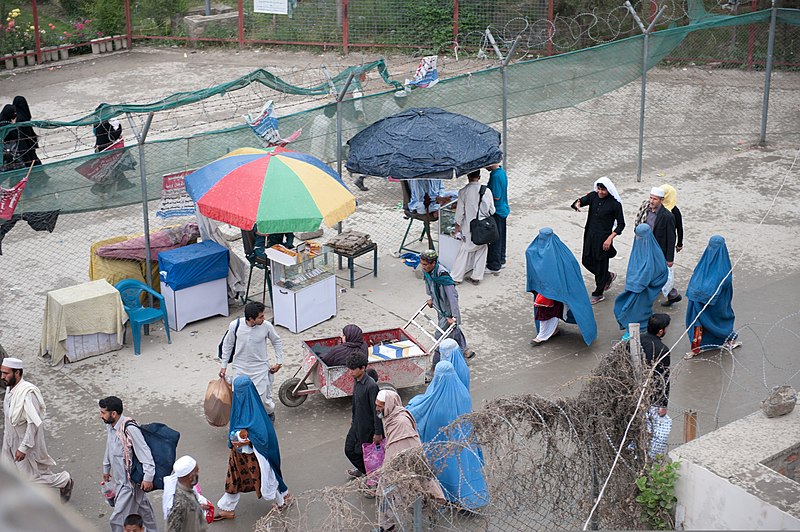Afghanistan’s Taliban administration announced that they would be reopening the country’s key trade route with Pakistan. The reopening comes four days after the border crossing was closed off and left many trucks carrying food and other items stranded in the area.
The Taliban government announced the reopening of the Torkham border crossing it shares with Pakistan four days after the border was closed off. The decision by the Taliban to reopen the border crossing follows the meeting between a high-level Pakistani delegation led by Pakistani defense minister Khawaja Asif visited Afghanistan’s capital Kabul the day before to discuss security, among other issues.
The delegation met with Afghanistan’s deputy prime minister for economic affairs, Mullah Abdul Ghani Baradar and other Taliban officials. At the time, the Afghan embassy in Islamabad announced that the Torkham trade route would be reopened on Thursday due to a “breach of commitments” by Pakistan.
Pakistani officials said on Thursday that they would be reopening their side of the border after completing the “administrative requirements.”
“We are just completing the necessary documentation and other administrative work before reopening the gate which is expected in another few hours,” said a Pakistani security official to Al Jazeera.
Afghanistan and Pakistan share a 2,600-kilometer-long border. The Taliban said it closed the Torkham border crossing due to Islamabad allegedly denying entry to Afghan migrants seeking medical care. Pakistan has accused the insurgent group of harboring armed attackers that are members of the outlawed Pakistan Taliban, also known as the TTP.
The TTP has been accused of the surge of violent attacks across Pakistan, killing dozens. The meeting in Kabul was amidst the TTP’s attacks in the country.
A report released on Thursday by the Crisis Group warned against international donors cutting off aid to Afghanistan following the Taliban’s policies barring women from participating in aid work and education.
The report called for Western countries to find a “liminal space between pariah and legitimate status” in order to respond to the humanitarian crisis the country has been under since the Taliban retook control of Afghanistan in 2021 following the withdrawal of foreign military forces.



 Netanyahu to Meet Trump in Washington as Iran Nuclear Talks Intensify
Netanyahu to Meet Trump in Washington as Iran Nuclear Talks Intensify  U.S. to Begin Paying UN Dues as Financial Crisis Spurs Push for Reforms
U.S. to Begin Paying UN Dues as Financial Crisis Spurs Push for Reforms  New York Legalizes Medical Aid in Dying for Terminally Ill Patients
New York Legalizes Medical Aid in Dying for Terminally Ill Patients  Trump Signs Executive Order Threatening 25% Tariffs on Countries Trading With Iran
Trump Signs Executive Order Threatening 25% Tariffs on Countries Trading With Iran  TrumpRx Website Launches to Offer Discounted Prescription Drugs for Cash-Paying Americans
TrumpRx Website Launches to Offer Discounted Prescription Drugs for Cash-Paying Americans  Trump Lifts 25% Tariff on Indian Goods in Strategic U.S.–India Trade and Energy Deal
Trump Lifts 25% Tariff on Indian Goods in Strategic U.S.–India Trade and Energy Deal  South Korea Assures U.S. on Trade Deal Commitments Amid Tariff Concerns
South Korea Assures U.S. on Trade Deal Commitments Amid Tariff Concerns  U.S. Announces Additional $6 Million in Humanitarian Aid to Cuba Amid Oil Sanctions and Fuel Shortages
U.S. Announces Additional $6 Million in Humanitarian Aid to Cuba Amid Oil Sanctions and Fuel Shortages  Missouri Judge Dismisses Lawsuit Challenging Starbucks’ Diversity and Inclusion Policies
Missouri Judge Dismisses Lawsuit Challenging Starbucks’ Diversity and Inclusion Policies  India–U.S. Interim Trade Pact Cuts Auto Tariffs but Leaves Tesla Out
India–U.S. Interim Trade Pact Cuts Auto Tariffs but Leaves Tesla Out  US Pushes Ukraine-Russia Peace Talks Before Summer Amid Escalating Attacks
US Pushes Ukraine-Russia Peace Talks Before Summer Amid Escalating Attacks  Trump Allegedly Sought Airport, Penn Station Renaming in Exchange for Hudson River Tunnel Funding
Trump Allegedly Sought Airport, Penn Station Renaming in Exchange for Hudson River Tunnel Funding  Trump’s Inflation Claims Clash With Voters’ Cost-of-Living Reality
Trump’s Inflation Claims Clash With Voters’ Cost-of-Living Reality  Trump Says “Very Good Talks” Underway on Russia-Ukraine War as Peace Efforts Continue
Trump Says “Very Good Talks” Underway on Russia-Ukraine War as Peace Efforts Continue  Japan Election 2026: Sanae Takaichi Poised for Landslide Win Despite Record Snowfall
Japan Election 2026: Sanae Takaichi Poised for Landslide Win Despite Record Snowfall  Pentagon Ends Military Education Programs With Harvard University
Pentagon Ends Military Education Programs With Harvard University  U.S. Lawmakers to Review Unredacted Jeffrey Epstein DOJ Files Starting Monday
U.S. Lawmakers to Review Unredacted Jeffrey Epstein DOJ Files Starting Monday 































